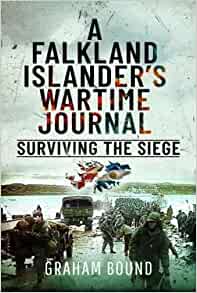A fascinating memoir
4 steloj
I was still at primary school in 1982 and my only real memory of the Falklands War is of classmates huddled round a radio at lunchtimes in the school canteen, eagerly listening to BBC World Service news reports from the other side of the world. It was strange to realise now, through reading Graham Bound's fascinating memoir, that the Islanders themselves relied on those exact same news reports to find out what was happening just down the road. Bound's journals seem to have been minimally edited so his writing retains a compelling immediacy. I could easily envisage him lying awake on the floor behind stacks of chairs, deafened by the encroaching bombardment, or imagine the worry of not being able to contact friends on outlying farm settlements when the local radio network was outlawed. I've read a number of civilian wartime memoirs over the past few years and A Falkland …
I was still at primary school in 1982 and my only real memory of the Falklands War is of classmates huddled round a radio at lunchtimes in the school canteen, eagerly listening to BBC World Service news reports from the other side of the world. It was strange to realise now, through reading Graham Bound's fascinating memoir, that the Islanders themselves relied on those exact same news reports to find out what was happening just down the road. Bound's journals seem to have been minimally edited so his writing retains a compelling immediacy. I could easily envisage him lying awake on the floor behind stacks of chairs, deafened by the encroaching bombardment, or imagine the worry of not being able to contact friends on outlying farm settlements when the local radio network was outlawed. I've read a number of civilian wartime memoirs over the past few years and A Falkland Islander’s Wartime Journal stands out for giving an authentic, day by day, sense of what it was like to be in the midst of such chaos.
I appreciated too that the Islanders experience and expectations were very different from the belligerent, jingoistic social memory of the war that has been retained in England. Bound's journals reveal that the Falkland Islanders themselves hadn't felt particularly valued by the UK, and certainly not by Westminster, until their being invaded provided a politically expedient distraction from the Tory government's woes at the time. Exactly forty years later, I did recognise a repeat of this political tactic being employed!
A Falkland Islander’s Wartime Journal is a very readable memoir which I particularly enjoyed for its focus on ordinary people during wartime. The interactions between Islanders and Argentine troops are particularly illuminating as these moments don't fit with either nation's Governments' declarations of strength and power. Bound does also explain some of what happened militarily, but doesn't get bogged down in endless military strategy. I felt I came to know these Island people a little and it would interesting to also learn how they coped in the war's aftermath. Once all the news reporters had gone and the global spotlight faded, how normal a 'normal life' could actually be resumed.

